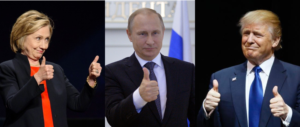Is Geopolitics Back?
Here’s What You Need To Know
Over 500 companies have withdrawn from or otherwise reduced their business relations with Russia since the invasion of Ukraine began, but, as a “hall of shame” being compiled by Yale University researchers notes, dozens more are “continuing business-as-usual in Russia.” The list and the accompanying news and social media coverage it has garnered are a clear indication that alongside the world’s rightful uproar at Russian President Vladimir Putin is a rising expectation that companies will cut ties with Russia in a similar fashion that we have seen in recent charged social issue debates here at home.
The scrutiny means at least for the moment, geopolitics is back as a central consideration to companies’ and industries’ political and reputational risks. For public affairs professionals helping navigate these risks, questions abound. Does the Russian divestment push signify a new norm forcing businesses to bring great consideration to where in the world they operate? Will demands to leave the Russian market last, or will the scrutiny fade as the blue and yellow flags on social media profiles do? Even if the public attention wanes, to what extent will new legal and regulatory requirements and policymaker interest remain?
For many industries, exiting the Russian market is not a simple task or as ethically and morally clear as social media may presume. Even for businesses that do not operate internationally, these questions bear consideration, as governments at every level – multilateral, federal, and even states and local – take action. As what could be a new era of geopolitics unfolds, here’s what you need to know.
Subscribe to Receive Insights
"*" indicates required fields
Are You Now or Have You Ever Done Business in Russia?
A GLOBAL PUSH TO DIVEST FROM RUSSIA: European Union countries have made clear they intend to wage “total economic and financial war” to “cause the Russian economy to collapse,” according to French economy minister Bruno Le Maire. Norway’s largest pension fund, KLP Group, and Denmark’s AkademikerPension, for example, have announced plans to dump their holdings in Russia. The push is coming from beyond government, as well. Last week just outside of Paris environmental activists spray-painted the headquarters of major oil producer TotalEnergies in protest over the company’s lack of a plan to divest from its significant holdings in Russia. Beyond Europe, major Japanese-based automotive manufacturers Mitsubishi and Toyota, as well as UAE-based Dubai Aerospace Enterprise (DAE), have divested from their operations in Russia.
A BROAD WASHINGTON CONSENSUS IS PUSHING COMPANIES TO DIVEST: Few things today unite Republicans and Democrats, but the current situation with Russia and Ukraine has done it. The U.S. House of Representatives voted near-unanimously to revert U.S.-Russia trade relations back to what they were during the Cold War. This vote came on the heels of another House vote last week banning the importation of Russian fossil fuels, a move also ordered by the Biden Administration. Additionally, the U.S. House Financial Services Committee is now asking U.S.-based banks and other firms to give the panel detailed information regarding the steps they have taken to cease their business activities with Russia. Companies in a wide range of industries should expect similar questions from policymakers.
STATE PUBLIC PENSION FUNDS WIELD THEIR OWN POWER TO PRESSURE COMPANIES: While more symbolic actions by state governments – like dumping out Russian-sounding vodka brands – may have been swift, in the long term, it is the political power of state pension funds that could impact companies and investors the most. At least a dozen states and some cities have either implemented or are considering implementing their own measures against Russia. Most notably, California governor Gavin Newsom and Golden State legislators are taking steps to divest three major state pension funds – CalPERS, CalSTRS, and the University of California – from their collective $1.5 billion invested in Russian entities. Not all states are doing so, however. Florida Governor Ron DeSantis has remained quiet in response to pressure from both Republicans and Democrats in Florida’s congressional delegation pushing the state to divest.
Will Divestment Pressures Spread to Other Bad Actors?
AMERICANS WANT COMPANIES OUT OF RUSSIA – BUT FOR HOW LONG? The rising pressure on companies to exit Russia is not surprising. Polling shows an overwhelming majority of Americans want American companies out of Russia, but remain “split on how long companies’ severed business ties with Russia should last.” That split expectation complicates businesses’ response, given the complexity of exiting a large economic market and the precedent it could set. That precedent comes as the world, geopolitically-speaking, is potentially at its most unstable and least peaceful state since the Cold War ended while the ease of scrutinizing both companies and the countries they operate in has grown exponentially.
IF COMPANIES SHOULD LEAVE RUSSIA, WHAT ABOUT OTHER COUNTRIES FACING WORLD OPPROBRIUM? Many analysts worry the Russian invasion of Ukraine could embolden China to increase its aggression against Taiwan. Such an invasion would complicate matters for U.S. companies that have already looked the other way as China faces sanctions over its treatment of the Uighurs and its suppression of Hong Kong. Furthermore, the Biden Administration’s pursuit of a renewed nuclear deal with Iran could reignite scrutiny of and divestment from companies doing business with that repressive regime. The potential reopening of Venezuela to calm oil markets could open a similar dilemma.
COMPANIES’ RUSSIA RESPONSE COULD SHAPE EXPECTATIONS FOR THEIR ACTIONS ELSEWHERE. As our firm’s founder and CEO Jeff Berkowitz discussed last fall on a podcast for the Global Business Alliance, companies were already facing pressure from activists and policymakers to divest from or remain committed to various countries and regions. The heightened scrutiny following Russia’s invasion will only make those pressures a larger concern, particularly as the growing number of ESG commitments made by companies meet this new geopolitical era and companies’ actions in response to Russia are likely to inform expectations for their actions regarding other geopolitical conflicts.
Amidst the Clamor, Breaking Up Is Hard To Do
For many businesses, exiting Russia is easier tweeted than done. Beyond the logistical and contractual complexities of exiting the world’s 11th largest economy, there are a number of legal, logistical, and moral challenges companies must consider. For pharmaceutical companies and agricultural suppliers, cutting off the Russian people from lifesaving and life-sustaining goods is an ethical quandary. Even less essential businesses “face a duty of caretoward their workers” that would be left behind, Politico notes. Indeed, many of those workers could face repercussions from Putin if their multinational employers leave Russia. In addition, as some firms such as Koch Industries have noted, Russia bankruptcy laws could enable Russia’s government or favored corporate proxies to seize their assets, literally enriching the government divestment is intended to impoverish.
Geopolitics Is Back, so Prepare for It To Stay for a While
Public affairs professionals will need to help their organizations determine if we are in a new normal where geopolitics is back, and whether such pressures will apply beyond the Russian invasion of Ukraine to other countries facing international censure. Those pros will also need to help their organizations determine if such scrutiny is ephemeral, a social action moment that will be surpassed by the next outrage, or a real moment when a long-term shift takes place.
Leaving a large economic market is a complex business decision not easily resolved in a tweet. Harmonizing that reality with the very real current scrutiny from consumers, advocates, and policymakers will be the challenging task ahead, not just on Russia but potentially in future geopolitical developments. To make the most informed and sound decision on whether to take a stand – or what stand should be taken – public affairs professionals will need the correct insights to identify who all their stakeholders are and how to understand their expectations and weigh the costs of associated with divestment.



